|
|
|
Sort Order |
|
|
|
Items / Page
|
|
|
|
|
|
|
| Srl | Item |
| 1 |
ID:
119533
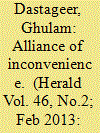

|
|
|
| 2 |
ID:
100768
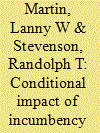

|
|
|
|
|
| Publication |
2010.
|
| Summary/Abstract |
Previous research on coalition politics has found an "incumbency advantage" in government formation, but it has provided no clear explanation as to why this advantage exists. We classify existing theories as either preference-based or institutions-based explanations for why incumbent coalitions might be likely to form again, and we integrate these explanations into a coherent theoretical argument. We also claim that it is possible, to some extent, to distinguish these explanations empirically by taking into account the "historical context" of coalition bargaining. Using a comprehensive new data set on coalition bargaining in Europe, we show that coalitions, in general, are more likely to form if the parties comprising them have worked together in the recent past, and that incumbent coalitions are more likely to re-form if partners have not experienced a severe public conflict while in office together or suffered a recent setback at the polls. The incumbency advantage disappears completely if partners have become mired in conflict or have lost legislative seats (even after accounting for the impact of seat share on coalition size). Moreover, in certain circumstances, institutional rules that grant incumbents an advantage in coalition bargaining greatly enhance their ability to remain in office.
|
|
|
|
|
|
|
|
|
|
|
|
|
|
|
|
| 3 |
ID:
106344
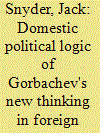

|
|
|
|
|
| Publication |
2011.
|
| Summary/Abstract |
In a chapter, in Myths of Empire (1991), I argued that Gorbachev was seeking to transform atavistic ideas and institutions that had been functional for the initial stage of building socialism, but had become fetters on production and a danger to Soviet security. New concepts of international relations were needed to reduce the dangers and costs of the old confrontational mindset, and also to justify a shift in domestic arrangements away from the military industrial complex, central planning and obsessive secrecy. Together with the international contextual factors that helped to set this process in motion, this domestic political dynamic explains both the peaceful end of the cold war and also the collapse of the Soviet system, which was an unintended byproduct of the democratizing tactics that Gorbachev used to overcome resistance from the old-school military-industrial and ideological elites. These arguments are generally supported by recent accounts of the Soviet collapse and the end of the cold war.
|
|
|
|
|
|
|
|
|
|
|
|
|
|
|
|
| 4 |
ID:
127467
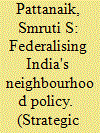

|
|
|
|
|
| Publication |
2014.
|
| Summary/Abstract |
The politics of coalition has posed new challenges to India's foreign policy. This problem becomes particularly evident in India's neighbourhood, which inevitably becomes intertwined with domestic politics. The rise of regional political parties and their role as coalition partners makes it more difficult for the union government to ignore provincial sentiments. Competitive politics featuring both national and regional political parties provides primacy to local interest as this is linked to the vote bank politics. Given the fact that coalition politics has become a reality, this article analyses how to engage the states and make them stakeholders in furthering India's neighbourhood policy.
|
|
|
|
|
|
|
|
|
|
|
|
|
|
|
|
| 5 |
ID:
124177
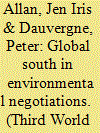

|
|
|
|
|
| Publication |
2013.
|
| Summary/Abstract |
During international environmental negotiations developing countries have commonly employed a unified strategy through the G-77 and China (G-77/China). Compared with other negotiations, such as those on trade and security, this strategy has been relatively successful in securing financial and technical benefits. Unity among developing states is not, however, a characteristic of all environmental negotiations. This paper analyses the case of Reducing Emissions from Deforestation and Degradation plus conservation ( redd +), where unity has been absent. It argues that the negotiation positions, strategies and coalition politics from 2005 to 2013 have been a result of identifiable power asymmetries among developing states (shifting over time). Some states with vast forest resources have held an effective veto, while others have had considerable moral influence and expert authority. Coalitions have courted such relevant and reputational leaders. At the same time some developing states have had enough diplomatic capacity and economic power to stand alone in negotiations. Taking a broad, historical view of the diverse forest interests and power asymmetries among developing states helps to explain the recent stagnation in negotiations to establish an international redd+ mechanism to mitigate climate change.
|
|
|
|
|
|
|
|
|
|
|
|
|
|
|
|
| 6 |
ID:
110822
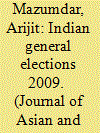

|
|
|
|
|
| Publication |
2012.
|
| Summary/Abstract |
This article argues that the results of the Indian General Elections, 2009, emphasize continuity more than change. Regional political parties, local-level issues and identity-based politics remain significant. The verdict represents a confirmation of established patterns of electoral politics in India and not a break with the recent past.
|
|
|
|
|
|
|
|
|
|
|
|
|
|
|
|
| 7 |
ID:
118047
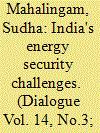

|
|
|
| 8 |
ID:
077424
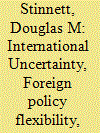

|
|
|
|
|
| Publication |
2007.
|
| Summary/Abstract |
This article explains the prevalence of surplus majority government coalitions in Israel as a result of the interaction between international uncertainty and the need to preserve both government stability and latitude in the conduct of foreign policy. I develop a game-theoretic model of government formation in which the international environment is a source of uncertainty for the policy preferences of the prime minister. The model predicts that when uncertainty is high enough, it is optimal for the prime minister to establish an oversized coalition government. By including expendable parties in a government, the prime minister has greater freedom to modify foreign policy in response to the international environment without jeopardizing majority status in parliament. The logic of the model is analyzed through two case studies: Menachem Begin, 1977-1981, and Ehud Barak, 1999-2000. The findings of the model have larger theoretical implications for the connection between domestic politics and international relations
|
|
|
|
|
|
|
|
|
|
|
|
|
|
|
|
| 9 |
ID:
139169
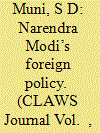

|
|
|
|
|
| Summary/Abstract |
Prime Minister Narendra Modi’s first foreign policy message was to rebuild neighbourhood relations in the South Asian region. He invited all the heads of the government of the South Asian Association for Regional Cooperation (SAARC) countries to participate in his oath taking ceremony on May 26, 2014. This was to indicate that the neighbourhood was the top priority of Modi’s foreign policy. A feeling of alienation and a degree of disenchantment had set in in India’s relations with the neighbours during the last years of the Manmohan Singh regime. Even where the Singh government wanted to push forward, like in the case of Bangladesh, it was constrained by coalition politics. In Nepal, the drift in Constitution making had vitiated bilateral relations with India. Dr. Manmohan Singh’s dream of having breakfast in Amritsar, lunch in Islamabad and dinner in Kabul got trapped in Pakistan’s inability and unwillingness to move on the question of cross-border terrorism against India. Sri Lanka and Maldives were being lured by the Chinese economic promise and strategic balancing. SAARC, being a hostage to the bilateral dynamics between India and its neighbours, has been performing far below its expectations and promise.
|
|
|
|
|
|
|
|
|
|
|
|
|
|
|
|
| 10 |
ID:
180530
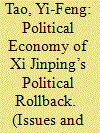

|
|
|
|
|
| Summary/Abstract |
When Xi Jinping had just come to power in 2012, the world expected that he would continue the development trajectory of economic liberalization and political institutionalization set in motion by Deng Xiaoping. However, when the National People’s Congress abolished the presidential term limit in the Chinese Constitution in March of 2018, it suddenly became clear that Xi had chosen to “roll back” from Deng’s policy line in nearly every aspect of the Chinese Party-state system. How does one explain Xi’s sudden departure from Deng’s policy line? In comparison with the resurgence of other authoritarian regimes of the 1960s and 1970s in Latin America and East Asia, this paper argues that the cause of Xi’s political rollback lies in the exhaustion of the previous development model. More specifically, the exhaustion of export-led growth in the mid-2000s had made the existing distributive coalition unsustainable. The power struggle within the political coalition therefore intensified and finally led to Xi’s monopoly over political power. The argument of this paper will proceed through four parts. It will begin with a literature review of comparative authoritarianism with a particular focus on the impact of a development crisis on the survival of political coalitions. It is followed by an analysis of the contributions of China’s export-led growth to the sustainability of the political coalition during the eras of Jiang Zemin and Hu Jintao. Then, it will explain how the exhaustion of export-led growth led to a power struggle within the political coalition and how through a re-orientation of the development model, Xi has gradually concentrated power into his own hands. Finally, it will discuss the theoretical implications of China’s case.
|
|
|
|
|
|
|
|
|
|
|
|
|
|
|
|
| 11 |
ID:
140015
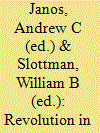

|
|
|
|
|
| Publication |
Berkeley, University of California Press, 1971.
|
| Description |
x, 185p.hbk
|
| Standard Number |
0520019202
|
|
|
|
|
|
|
|
|
|
|
|
Copies: C:1/I:0,R:0,Q:0
Circulation
| Accession# | Call# | Current Location | Status | Policy | Location |
| 009651 | 943.9/JON 009651 | Main | On Shelf | General | |
|
|
|
|
| 12 |
ID:
165250
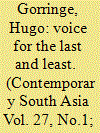

|
|
|
|
|
| Summary/Abstract |
Between 2009 and 2014, Thirumavalavan, the leader of the largest Dalit party in Tamil Nadu, served as an MP in Delhi. This paper draws on research with the Viduthalai Chiruthaigal Katchi (VCK or Liberation Panther Party) to raise a number of key questions about representation and democracy in a multi-level federal system. Although they are a minor party, their experience of national politics offers insights into the workings of party systems in India. The paper considers the extent to which they are constrained by alliance partners and political rules-of-the-game. It then considers the question of representation, and asks what the VCK managed to achieve in Thirumavalavan’s constituency of Chidambaram and the extent to which they could raise issues at the national level both through formal and disruptive means. Finally, the paper reflects on the advantages and disadvantages for a small party of having a foothold in the Centre and draws out the lessons of the VCK’s experience for our understanding of Indian politics.
|
|
|
|
|
|
|
|
|
|
|
|
|
|
|
|
| 13 |
ID:
117122
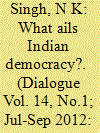

|
|
|
| 14 |
ID:
181132
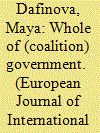

|
|
|
|
|
| Summary/Abstract |
Whole-of-government (WOG) approaches have emerged as a blueprint for contemporary peace and state-building operations. Countries contributing civilian and military personnel to multinational interventions are persistently urged to improve coherence and enhance coordination between the ministries that form part of the national contingent. Despite a heated debate about what WOG should look like and how to achieve it, the causal mechanisms of WOG variance remains under-theorised. Based on 47 in-depth, semi-structured interviews, this study compares Swedish and German WOG approaches in the context of the International Security Assistance Force (ISAF). I argue that coalition bargaining drove the fluctuation in the Swedish and German WOG models. Strategic culture was an antecedent condition. In both cases, COIN and the war on terror clashed with foundational elements of the Swedish and German strategic cultures, paving the way for a non-debate on WOG on the political arena. Finally, bureaucratic politics was an intervening condition that obstructed or enabled coherence, depending on the ambition of the incumbent coalition government to progress WOG. Overall, the results suggest that coalitions face limitations in implementing a WOG framework when the nature of the military engagement is highly disputed in national parliaments.
|
|
|
|
|
|
|
|
|
|
|
|
|
|
|
|
|
|
|
|
|